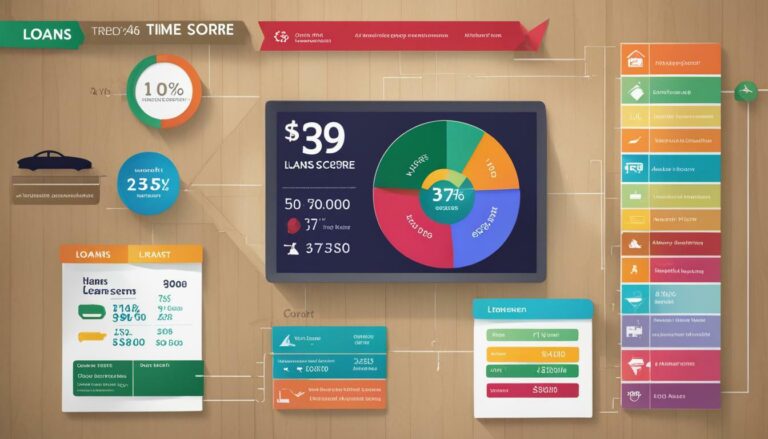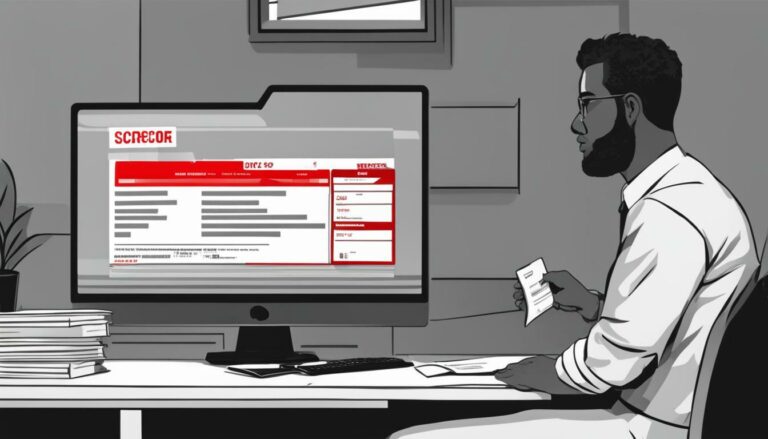Unlock Strategies to Boost Credit Score Quickly – Your Guide

Boosting your credit score quickly is possible with the right strategies and techniques. If you want to improve your credit score and increase your chances of getting better loan terms and financing options, there are several effective credit score strategies you can implement. By understanding how credit scores are calculated and taking proactive steps, you can see significant improvements in your credit score over time.
One of the first steps in boosting your credit score quickly is to check your credit reports from the three major credit bureaus – Equifax, Experian, and TransUnion. These reports provide insight into your credit history, allowing you to identify any errors or discrepancies that may be negatively impacting your score. Additionally, setting alerts for bill due dates and making sure to pay your bills on time is crucial for maintaining a good credit score and avoiding late payments penalties.
Paying down credit card balances and keeping your credit utilization low is another important strategy. High credit card balances and utilization can negatively affect your credit score, so it’s essential to pay off outstanding balances and utilize only a small percentage of your available credit limit.
It’s also crucial to avoid closing old credit card accounts or applying for too many new ones. Closing old accounts can negatively impact your credit history, while applying for multiple new credit cards can be seen as a sign of financial instability. Instead, focus on maintaining a few well-managed credit accounts.
To stay on top of your credit score, consider signing up for credit monitoring services. These services allow you to track your credit score regularly and receive alerts whenever there are significant changes or potential issues.
🚨 TUIC Errors + Low Credit Score?
CreditScoreIQ helps you build credit faster by reporting utility bills to all 3 bureaus—while you dispute errors.
Start Building Credit Today →Key Takeaways:
- Regularly check your credit reports to identify and correct any errors or discrepancies.
- Set alerts for bill due dates and pay your bills on time.
- Pay down credit card balances to keep your credit utilization low.
- Avoid closing old credit card accounts or applying for too many new ones.
- Consider signing up for credit monitoring services to track your progress.
Understanding Credit Scores and Their Importance
Credit scores play a crucial role in determining your eligibility for loans and financing options. Lenders use your credit score to assess your creditworthiness and determine the terms and interest rates they offer. A good credit score can open doors to better loan terms, lower interest rates, and easier approval for mortgages, car loans, and personal loans.
When you apply for a loan or a credit card, lenders look at your credit score to evaluate the risk they are taking by extending credit to you. A higher credit score indicates that you are a responsible borrower who is more likely to repay your debts on time. This can give lenders the confidence to offer you more favorable loan terms and financing options.
One way to understand credit scores is to think of them as a barometer of your financial health. Just as a barometer measures atmospheric pressure, your credit score measures your financial reliability. It reflects your borrowing and repayment history, the amount of credit you are currently utilizing, the length of your credit history, and other factors that demonstrate your ability to handle debt responsibly.
It’s important to monitor your credit score regularly and take steps to improve it if necessary. By practicing good credit management habits like paying bills on time, keeping credit card balances low, and avoiding excessive credit applications, you can gradually increase your credit score over time.

Regularly checking your credit reports from the major credit bureaus is essential for understanding your current credit standing. Your credit reports provide a detailed overview of your credit history, including information about your open and closed accounts, payment history, and any negative marks or errors that may be impacting your credit score.
To access your credit reports, you can visit the websites of the three major credit bureaus – Equifax, Experian, and TransUnion. Each bureau may have slightly different information, so it’s important to review all three reports for accuracy. You are entitled to one free copy of your credit report from each bureau every 12 months.
Once you have obtained your credit reports, take the time to carefully review them for any errors or discrepancies. Look for any accounts or inquiries that you do not recognize, as this could be a sign of fraudulent activity. If you find any inaccuracies, you can dispute them with the credit bureaus to have them corrected.
| Credit Bureau | Website |
|---|---|
| Equifax | www.equifax.com |
| Experian | www.experian.com |
| TransUnion | www.transunion.com |
Why Credit Monitoring Services Matter
In addition to checking your credit reports on your own, you may also consider signing up for credit monitoring services. These services provide ongoing monitoring of your credit reports and alert you to any changes or potential issues. They can help you stay on top of your credit score and quickly address any problems that may arise.
Credit monitoring services offer various features, such as real-time credit alerts, identity theft protection, and credit score tracking. They can also provide personalized recommendations on how to improve your credit score based on your individual financial situation.
Remember, maintaining good credit is an ongoing process. Regularly checking your credit reports and utilizing credit monitoring services can help you stay informed about your credit status and take steps to improve your credit score over time.

Paying your bills on time is one of the most effective ways to boost your credit score quickly. By consistently meeting your payment deadlines, you demonstrate responsible financial behavior, which is highly regarded by lenders and credit bureaus. Late payments can have a negative impact on your credit score, so it’s crucial to stay on top of your bills.
To ensure timely payments, consider setting up automatic reminders or alerts for bill due dates. Many banks and financial institutions offer these services, making it easier for you to keep track of your payment obligations. You can also use personal finance apps or software that send notifications to help you stay organized and avoid missing any due dates.
Remember, a missed payment can stay on your credit report for up to seven years, so it’s essential to prioritize paying your bills on time.
Additionally, making more than the minimum payment can also positively impact your credit score. By reducing your outstanding balances, you lower your credit utilization ratio, which compares the amount of credit you’ve used to your total available credit. Aim to keep your credit utilization below 30% to demonstrate responsible credit management.
By adopting these strategies and making bill payments a priority, you can steadily improve your credit score over time and open the doors to better loan terms and financing options. Keep in mind that building good credit takes patience and consistency, but the effort is worthwhile in the long run.
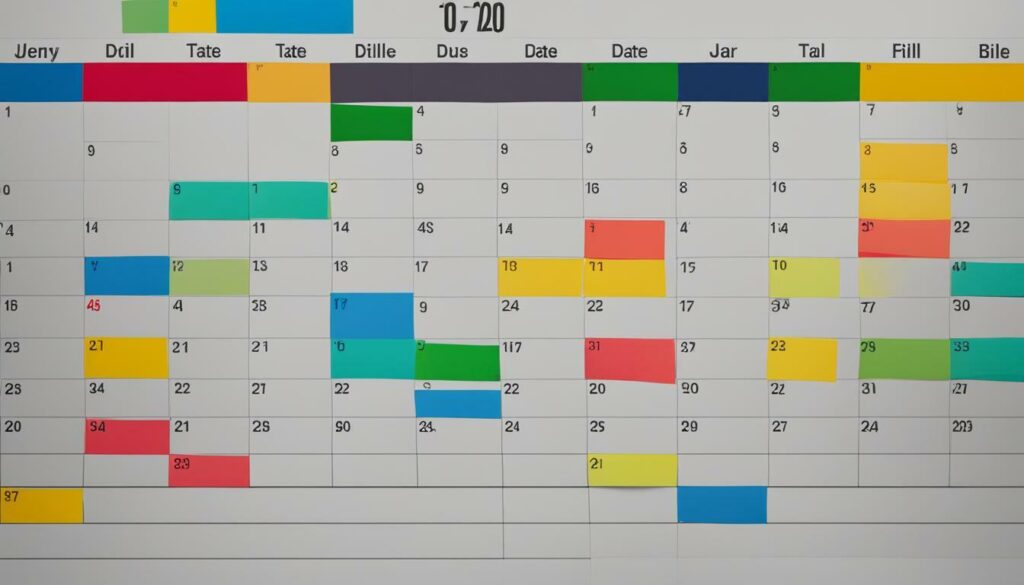
| Benefits of Paying Bills On Time |
|---|
| 1. Improved credit score |
| 2. Easier access to loans and financing options |
| 3. Lower interest rates on credit cards and loans |
| 4. Avoidance of late payment fees and penalties |
Managing Credit Card Balances and Utilization
Managing your credit card balances and keeping your credit utilization low can have a significant impact on your credit score. Credit utilization refers to the percentage of your available credit that you are currently using. To maintain a healthy credit utilization ratio, it’s important to understand how much you owe on your credit cards and how much credit you have available.
One effective strategy is to pay down your credit card balances as much as possible. Aim to keep your balances well below your credit limits. This shows lenders that you are responsibly managing your credit and can help boost your credit score over time. It’s also important to make your credit card payments on time each month to avoid late payment fees and negative marks on your credit report.
Another way to manage your credit card balances is to consider increasing your credit limit. This can help improve your credit utilization ratio if you maintain the same level of spending. However, be cautious when requesting credit limit increases, as too many requests within a short period of time can potentially negatively impact your credit score. It’s important to strike a balance and only request increases when necessary.
| Credit Card Balances | Credit Utilization Ratio | Credit Limit |
|---|---|---|
| $1,000 | 20% | $5,000 |
| $500 | 10% | $5,000 |
| $3,000 | 60% | $5,000 |
By effectively managing your credit card balances and keeping your credit utilization low, you can improve your credit score and increase your chances of qualifying for better loan terms and other financing options in the future.
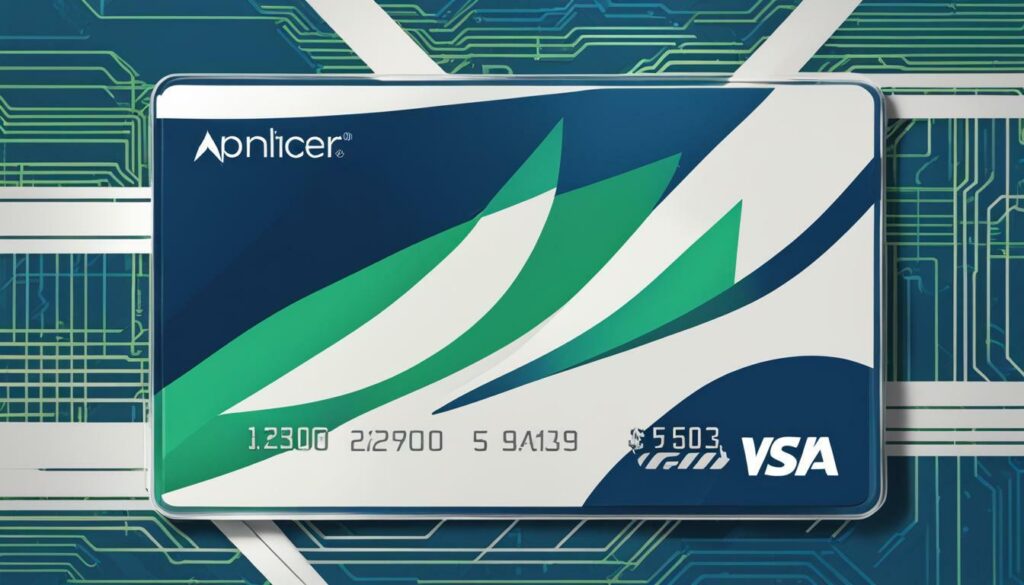
It’s important to avoid closing your old credit card accounts or applying for numerous new credit cards to maintain a healthy credit score. While it may be tempting to close old accounts that you no longer use or apply for new cards to take advantage of enticing offers, these actions can have a negative impact on your credit.
Closing old credit card accounts can harm your credit score because it reduces your available credit limit and shortens your credit history. Your credit utilization ratio, which is the amount of credit you are using compared to your total credit limit, plays a significant role in your credit score. By closing old accounts, you are effectively reducing your available credit, which can increase your credit utilization ratio.

Applying for multiple new credit cards within a short period can also lower your credit score. Every time you apply for credit, a hard inquiry is made on your credit report, which can temporarily decrease your score. Additionally, having too many new credit accounts can be seen as a risk factor by lenders, as it may indicate that you are taking on too much debt or having financial difficulties.
To maintain a healthy credit score, it’s important to be selective about which accounts you open and to keep your old accounts active. Focus on using your existing credit responsibly by making timely payments and keeping your balances low. By demonstrating responsible credit behavior over time, you can improve your credit score and increase your chances of being approved for favorable loan terms and financing options.
Building a Credit History
Building a solid credit history is essential for boosting your credit score quickly. Lenders and financial institutions rely on your credit history to assess your creditworthiness and determine whether they should approve your loan or financing application. By demonstrating responsible credit behavior over time, you can establish a positive credit history and improve your credit score. Here are some key steps to help you build a credit history:
- Review your credit reports: Check your credit reports from the three major credit bureaus – Equifax, Experian, and TransUnion. Look for any errors or inaccuracies that may be negatively impacting your credit score. Dispute any incorrect information and ensure that your credit reports accurately reflect your payment history and credit accounts.
- Get a handle on bill payments: Paying your bills on time is crucial for building good credit. Set alerts or reminders for bill due dates to ensure you never miss a payment. Late payments can have a significant negative impact on your credit score, so it’s important to stay organized and meet your payment obligations.
- Limit credit utilization: Credit utilization refers to the percentage of your available credit that you’re currently using. It’s recommended to keep your credit utilization below 30% for a healthy credit score. Paying down credit card balances and keeping your overall credit utilization low can positively impact your credit score.
- Avoid new credit requests: Opening multiple new credit accounts within a short period can raise concerns for lenders. It may seem like you’re in desperate need of credit, which could negatively impact your credit score. Limit new credit requests and focus on managing your existing credit responsibly.
- Build a credit history: If you’re new to credit or have limited credit history, consider opening a secured credit card or becoming an authorized user on someone else’s credit card. Making timely payments and keeping your credit utilization low will help you establish a positive credit history over time.
Building good credit takes time and requires consistent effort. By following these steps and being proactive in managing your credit, you can lay the foundation for a healthier credit score. Remember to regularly review your credit reports, stay on top of bill payments, keep credit utilization low, and avoid excessive new credit requests. With patience and responsible financial behavior, you can boost your credit score and improve your chances of accessing better loan terms and financing options.

Understanding Credit Score Calculation
Understanding how credit scores are calculated can help you strategize and make informed decisions to improve your credit score. Credit scores are numerical representations of your creditworthiness, ranging typically from 300 to 850. The higher your credit score, the better your chances of being approved for loans and credit, and the more favorable loan terms you may receive.
Credit score calculation involves various factors, each carrying a different weight in determining your overall score. The following table provides a breakdown of these factors:
| Factor | Weight |
|---|---|
| Payment history | 35% |
| Amount owed | 30% |
| Length of credit history | 15% |
| Credit mix | 10% |
| New credit | 10% |
Payment history carries the most significant weight in credit score calculation, emphasizing the importance of paying your bills on time. Amount owed refers to your credit card balances and credit utilization ratio, which is the percentage of your available credit that you’re using. Keeping your balances low and managing your credit utilization can positively impact your credit score.
The length of your credit history also plays a role, with longer credit histories generally being more favorable. Credit mix refers to having a diverse range of credit types, such as credit cards, loans, and mortgages. Lastly, new credit accounts for any recent credit inquiries or new accounts opened. It’s essential to be mindful of these factors and take steps to improve them to boost your credit score.
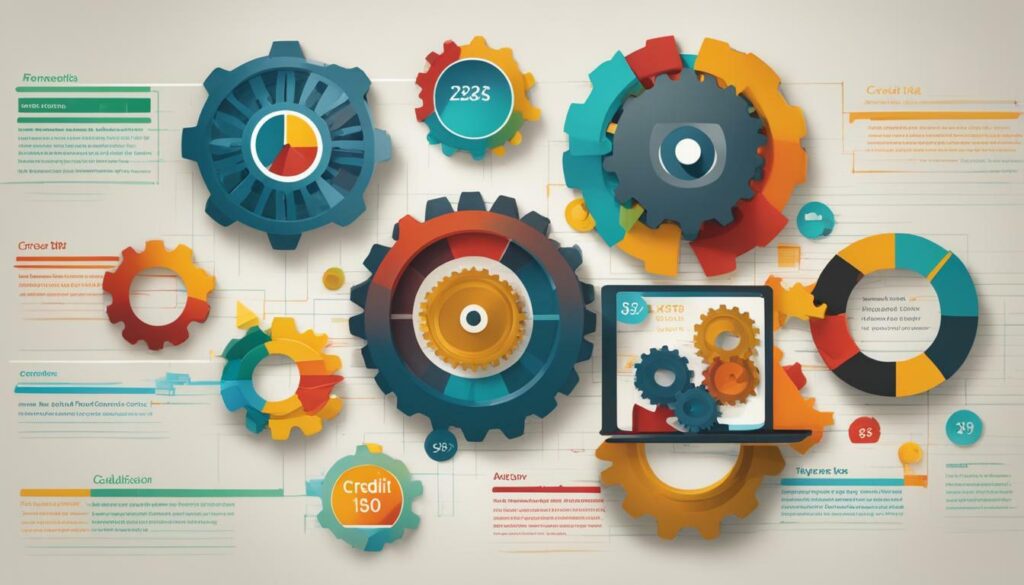
- Understanding credit score calculation is crucial for improving your credit score.
- Factors such as payment history, amount owed, length of credit history, credit mix, and new credit all influence your credit score.
- Paying bills on time, keeping your credit card balances low, and maintaining a diverse credit mix can positively impact your credit score.
By familiarizing yourself with the credit score calculation process and implementing strategies to improve your creditworthiness, you can work towards achieving a higher credit score and enjoy the benefits that come with it.
Effective Credit Score Strategies
Implementing these effective credit score strategies can help you achieve a rapid increase in your credit score. Follow these steps to improve your creditworthiness and open up new financial opportunities:
- Check your credit reports regularly: Review your credit reports from the three major credit bureaus – Experian, Equifax, and TransUnion. Look for any errors or discrepancies and dispute them if necessary. Keeping an eye on your credit reports helps you identify areas for improvement and ensures accuracy in your credit history.
- Pay your bills on time: One of the most important factors affecting your credit score is your payment history. Set up reminders or automatic payments to ensure you never miss a due date. Consistently paying your bills on time demonstrates your financial responsibility and can have a significant positive impact on your credit score.
- Manage credit card balances: Keeping your credit card balances low relative to your credit limits is crucial. Aim to use no more than 30% of your available credit to maintain a healthy credit utilization ratio. Paying down your balances can improve your credit score and show lenders that you can responsibly manage credit.
- Avoid closing old credit card accounts or opening too many new ones: Length of credit history is an important factor in calculating your credit score. Closing old accounts can shorten your credit history and potentially lower your score. Similarly, opening multiple new credit accounts within a short period of time can be viewed as a risk and negatively impact your creditworthiness. It’s generally best to keep your old accounts open and limit new credit applications.
Remember, building good credit takes time, so be patient and consistent in your efforts. By following these effective credit score strategies, you can take control of your financial future and improve your borrowing potential.
The Importance of Credit Monitoring
To track your progress and stay informed about changes to your credit score, consider signing up for credit monitoring services. These services provide regular updates on your credit score and alert you to any suspicious activities or inaccuracies in your credit reports. Credit monitoring can help you identify areas for improvement and take necessary actions to boost your credit score effectively.
Take advantage of the tools and resources available to you, and soon you’ll see the positive impact on your credit score. Remember, a higher credit score can open doors to better loan terms, lower interest rates, and increased financial stability.
| Benefit | Credit Score Impact |
|---|---|
| Lower interest rates | Higher credit scores can lead to lower interest rates on loans, saving you money in the long run. |
| Easier loan approval | Lenders are more likely to approve your loan applications with a higher credit score, giving you access to better financing options. |
| Favorable terms | Good credit scores can qualify you for more favorable loan terms, such as longer repayment periods or lower down payments. |
“Your credit score is a reflection of your financial responsibility. By implementing these effective credit score strategies, you can take control of your creditworthiness and pave the way for a brighter financial future.”

Boosting your credit score quickly requires patience, persistence, and the implementation of effective strategies.
Start by checking your credit reports from the three major credit bureaus to ensure accuracy and identify areas for improvement. Utilize credit monitoring services to stay on top of your credit score and receive timely alerts.
Make it a priority to pay your bills on time and set reminders for bill due dates to avoid late payments. This simple habit can have a significant impact on your credit score.
Additionally, focus on managing your credit card balances and keeping your credit utilization low. Paying down balances and keeping credit utilization below 30% can help boost your credit score.
Avoid closing old credit card accounts or applying for too many new ones. These actions can potentially have a negative effect on your credit score.
Building a solid credit history is essential in improving your credit score. Review your credit reports regularly, limit new credit requests, and establish a consistent payment history.
Understanding how credit scores are calculated and utilizing resources like credit monitoring can help you track your progress and make informed decisions to improve your credit over time.
Remember, there is no quick fix to raising credit scores. Implement these strategies consistently, and you will see gradual improvement in your credit score.
Boosting your credit score quickly may require time and effort, but the benefits of a good credit score, such as better loan terms and easier approval for loans and other financing options, are well worth it.
FAQ
What are some strategies to boost credit scores quickly?
Some strategies to boost credit scores quickly include checking credit reports, paying bills on time, managing credit card balances and utilization, avoiding closing old credit card accounts or applying for new ones, building a credit history, and understanding credit score calculation.
Why are credit scores important?
Credit scores are important because they impact loan terms and financing options. Good credit scores can lead to better loan terms and easier approval for loans and other financing options.
How can I check my credit reports?
You can check your credit reports from the three major credit bureaus. It is also advisable to sign up for credit monitoring services to stay on top of your credit score.
Why is paying bills on time crucial for boosting credit scores?
Paying bills on time is crucial because it shows responsible financial behavior and helps establish a positive payment history, which is a key factor in credit score calculation.
Why is managing credit card balances and utilization important?
Managing credit card balances and utilization is important because high credit card balances and utilization can negatively impact credit scores. Paying down balances and keeping credit utilization low can help improve credit scores.
Should I close old credit card accounts or apply for new ones?
Avoid closing old credit card accounts or applying for too many new ones as these actions can potentially hurt your credit score. It’s best to maintain a mix of old and new accounts and use credit responsibly.
How can I build a credit history?
Building a credit history involves using credit responsibly and consistently over time. This can include getting a credit card, making on-time payments, and keeping credit utilization low.
How are credit scores calculated?
Credit scores are calculated based on various factors such as payment history, credit utilization, length of credit history, types of credit used, and new credit inquiries. Understanding these factors can help you make informed decisions to improve your credit score.
What are some effective credit score strategies?
Some effective credit score strategies include paying bills on time, managing credit card balances and utilization, avoiding new credit requests, and building a solid credit history. These strategies, when implemented consistently, can help improve your credit over time.
Ready to Improve Your Credit?
Disputing TUIC errors is step one. Step two? Boost your score by reporting utility payments with CreditScoreIQ.
Get Started Now (Only $1 Trial) →3-bureau reporting • $1M identity insurance • Dark web monitoring


